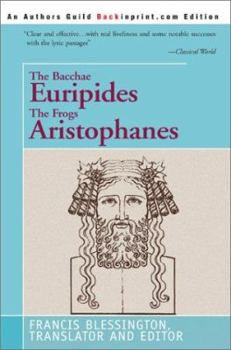The Bacchae Euripides The Frogs Aristophanes
Select Format
Select Condition 
Book Overview
Translations into contemporary poetry of two masterpieces of the Golden Age of Greek theatre. This description may be from another edition of this product.
Format:Paperback
Language:English
ISBN:059527210X
ISBN13:9780595272105
Release Date:April 2003
Publisher:iUniverse
Length:144 Pages
Weight:0.40 lbs.
Dimensions:0.5" x 5.1" x 7.9"
Customer Reviews
1 rating
The god Dionysus in both a Greek tragedy and a comedy
Published by Thriftbooks.com User , 20 years ago
At first glance it might seem odd to put Euripides' tragedy "The Bacchae," the most violent of the extant Greek dramas, with the comedy "The Frogs" by Aristophanes, but there is a common thread in that these are the two examples of Greek theater that deal most directly with Dionysus, the god of drama. Composed around the year 406 B.C.E. by Euripides, shortly before the tragic poet's death, "The Bacchae" dramatizes the myth of the return of Dionysus to his birthplace of Thebes, where the deity exacts a horrible revenge on the people because they have failed to honor his divinity by adopting his orgiastic worship. In doing so, Euripides takes his Athenian audience back to the Dionysian roots of its theater tradition and beyond, going back all the way to the wine god's ecstatic cult. The name of the play comes from the chorus, a group of foreign women who are passionately devoted to Dionysus (who was also known as Bacchus). Having followed their god from Asia Minor to Greece, these bacchants worship Dionysus voluntary, totally reveling in the emotional freedom and sense of joyous community that the god allows them. In their parados the bacchants dance wildly, praising the holy and irresistible gifts of Dionysus. The tragic hero in the play, albeit an unsympathetic one, is Pentheus, the king of Thebes. Pentheus stubbornly refuses Dionysus to be worshipped in Thebes, even though he is warned by Teiresias, the fabled blind prophet of Thebes (who appears in Sophocles' "Oedipus the King"). Pentheus is not only stubborn, he is also insolent and glib, making him as guilty of hubris as any tragic hero of Greek drama. For this affrontery to Dionysus, Pentheus is punished in a way as extreme as any in Greek mythology. To extract his revenge Dionysus gets Pentheus to dress as a woman, a daughter of Cadmus, so that he can sneak into the forest outside of Thebes to see the secret rites of the bacchants. However, the power of the wine god drives Agave, Pentheus's mother, and the other women of Thebes to madness. They abandon their homes to roam the hills of Cithaeron, where they nurse the young of wild animals and drink the wine provided by their god. There they wore fawn skins and crowns of ivy, waving thyrsoi, while dancing by torchlight and shouting a ritual cry. Even with all the miracles and warning signs, Pentheus stubbornly continues to resist Dionysus, and is condemned to die: not as the brave king defending his city but as a transvestite voyeur torn to pieces by his mother and the women on whom he had come to spy. The final scenes, in which Cadmus, the former king of Thebes, returns to find his daughter, who is carrying the head of her son, convinced in her madness that it is a trophy, the head of a lion she believes she and the bacchants have killed. The anagnorisis (recognition) scene written by Euripides is as powerful as any in Greek drama as Agave struggles against returning to her sense and the reality of the horrific deed she has done. Of course





